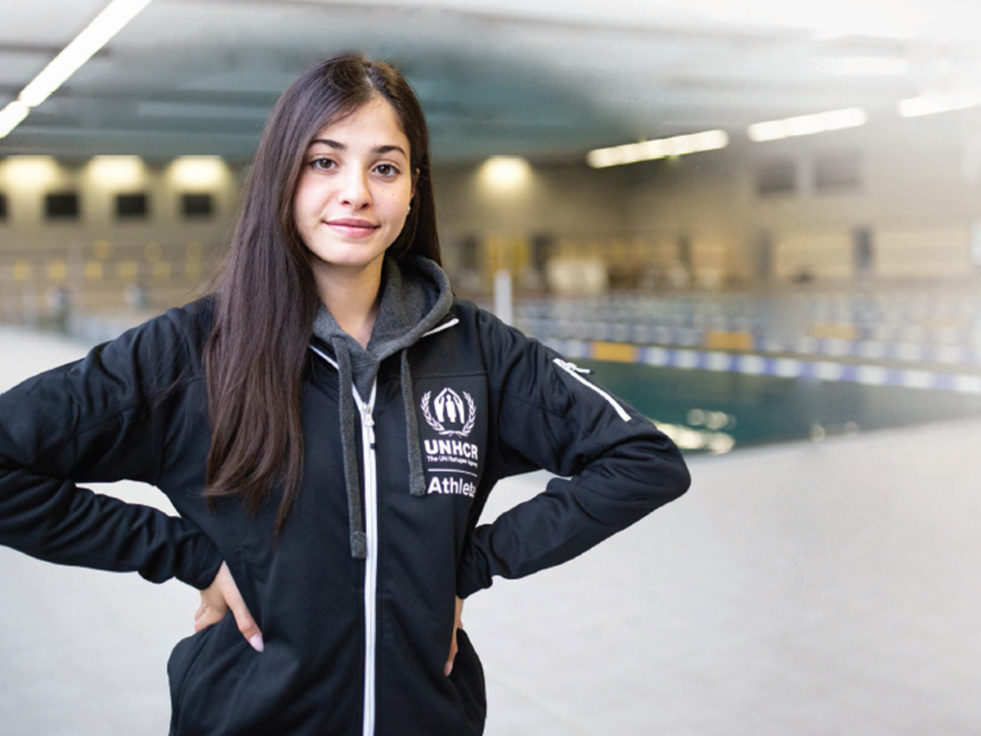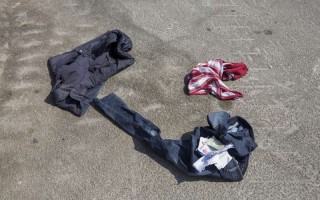
Refugee, Olympic swimmer and UNHCR Goodwill Ambassador Yusra Mardini during training for the Tokyo 2020 Olympics. © UNHCR/Paul Wu
Yusra Mardini is a UNHCR Goodwill Ambassador, a Syrian refugee, and an Olympian. She swam in Rio2016 as part of the first ever Refugee Olympic Team.
In 2015, I was 17, a high school student dreaming of representing my country at international swimming events. As the impact of the war in Syria came closer, and after we were forced to abandon our home in Darayya, my older sister Sara and I took the decision to travel to Europe.
We hoped to be able to bring our mother and our younger sister, Shahed, to safety too. As we were leaving, Shahed clung to us, sobbing, and begging us not to go.
It’s only around 10km from the Turkish coast to the north coast of the Greek island of Lesvos. In August 2015, Sara and I boarded a dinghy along with 18 others, including families with children. We all knew that many people had died making the journey ahead. We were all equally afraid. But we were all equally desperate to escape the violence that lay behind us. Like most of the boats that made that same crossing, ours was dangerously overcrowded. In that deceptively short stretch of sea, our engine failed.
The wind was blowing hard and our boat was being tossed and spun about on the waves. The light was fading. Sara and I were experienced swimmers but others on the boat were not. We took turns in the water, making the boat lighter and helping turn it to face the waves to prevent it from capsizing. We called for help but no one came.
The memory of that sea journey will remain with me always.
For over three hours we swam. Everyone was praying. At last, the engine spluttered back to life and we reached the shore.
I struggle with this story, to understand why we made it when many others didn’t. Each time I hear about a group drowning at sea, it takes me back there, clinging to the boat’s rope, desperately treading water.
In my role as a Goodwill Ambassador for UNHCR, the UN Refugee Agency, I’ve had the chance to meet many others who’ve endured their own desperate journeys while seeking safety. On a trip to Sicily with UNHCR, I heard stories from others who had crossed the sea from North Africa to Italy, stories that were full of hardship, heartbreak, grief and trauma. But ultimately, like my own, of survival.
I met a woman, Rita, who fled Nigeria with her one-year-old baby after her husband was brutally murdered. She told me about her horrific journey to Libya and then Europe. A journey on which she saw friends die along the way. I met a 12-year-old girl from Eritrea who was separated from her older sister while crossing the Mediterranean Sea and has not seen her since. She hoped to be able to join her brother in Germany. I met girls who told me they were sold during their journey.
It really broke my heart. Sometimes I can’t sleep at night after what I’ve heard.
The help we received in Germany allowed me to quickly move on with my life, to pursue my dream of competing at the Olympics. But, as highlighted in this new report by UNHCR, many other children are still facing incredible challenges and risks moving to and through Europe.
No one chooses to be a refugee, to leave everything behind for an uncertain future. But, like Sara and me, while wars continue to rage others will feel compelled to make similar decisions. And when people fleeing such violent situations and making such desperate journeys reach Europe we should all play our part in making sure they receive the help and support they need to quickly rebuild their lives.
This means making sure children who arrive in Europe have safe accommodation and are not kept in detention, that children are identified as children and can access the systems meant to help them, that children are well-informed of the options available to them, and that children from point of arrival onwards, are able to continue with their schooling uninterrupted.
Originally published on UNHCR on 14 October 2019





